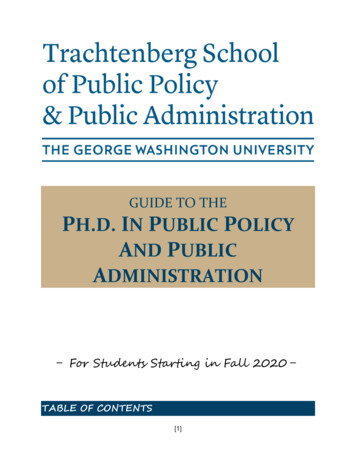
Transcription
GUIDE TO THEPH.D. IN PUBLIC POLICYAND PUBLICADMINISTRATION For Students Starting in Fall 2020 TABLE OF CONTENTS[1]
COMMON ABBREVIATIONSSECTION I: OVERVIEWOUR STUDENTSADVISING AND PROGRAM PLANNINGSECTION II: PROGRAM REQUIREMENTSPREREQUISITE COURSESCORE COURSESRESEARCH METHODS COURSESFIELD OF STUDY COURSESELECTIVES AND ADDITIONAL COURSESDISSERTATION CREDITSSECTION III: RECOMMENDED COURSE SEQUENCINGSECTION IV: FIELDS OF STUDYEDUCATION POLICYPROGRAM EVALUATIONPUBLIC AND NONPROFIT MANAGEMENTPUBLIC BUDGETING AND FINANCESCIENCE AND TECHNOLOGY POLICYSOCIAL POLICYGender and Social Policy SpecializationRace, Ethnicity and Public Policy SpecializationPoverty and Inequality SpecializationUrban Policy SpecializationSECTION V: THE COMPREHENSIVE EXAMINATIONSECTION VI: THE DISSERTATIONSECTION VII: POLICIES AND ADMINISTRATIVE ISSUESPROGRAM COMMITTEECOURSE LOAD AND ATTENDANCETRANSFERRING CREDITSREQUESTING LEAVES OF ABSENCE AND EXTENSIONS[2]
FULL-TIME STUDENT CERTIFICATIONTRAVEL AND RESEARCH SUPPORT FOR PH.D. STUDENTSTEACHING OPPORTUNITIESACADEMIC INTEGRITY POLICIESUNIVERSITY POLICY ON EQUAL OPPORTUNITYCONSORTIUM OF UNIVERSITIES AND LIBRARIESIMPORTANT UNIVERSITY CONTACTS DIRECTORYSECTION VIII: IMPORTANT FORMSPHD PROGRAM OF STUDY FORMPROPOSAL REVIEW SCHEDULING FORMDISSERTATION DEFENSE SCHEDULING FORMDISSERTATION AND PROPOSAL LISTSERV ANNOUNCEMENT TEMPLATESECTION IX: CONCLUSIONCOMMON ABBREVIATIONSACCYCCASCRNDNSCAccountancyColumbian College of Arts and SciencesCourse Reference NumberDecision Sciences[3]
MBADMPAMPA PSOCTSPPPAWRLCWGSSEconomicsEducation LeadershipEnvironmental Resource PolicyElliott School of International AffairsFinanceGeographyGeorge Washington UniversityGeorge Washington Institute of Public PolicyHistoryInternational AffairsInstitute for International Science and Technology PolicyLeave of AbsenceManagementMaster of Business AdministrationMaster of Public AdministrationMedia and Public Affairs BuildingMaster of Public PolicyPublic AdministrationPhilosophyPublic PolicyPublic Policy & Public AdministrationPublic Policy Student AssociationPolitical SciencePsychologyPublic HealthSchool of BusinessSchool of Media and Public AffairsStrategic Management and Public PolicySociologyTrachtenberg School of Public Policy & Public AdministrationWashington Research Library ConsortiumWomen’s, Gender, and Sexuality Studies[4]
SECTION I: OVERVIEWThe multidisciplinary Ph.D. Program in Public Policy and Public Administration (the Program)in the Trachtenberg School of Public Policy and Public Administration (the TrachtenbergSchool) at The George Washington University (GW) is designed to help students develop arange of competencies needed to undertake sophisticated research in public policy and publicadministration. Fundamental to the development of these competencies is a mastery of subjectsin multiple academic disciplines, including politics, economics, and quantitative and qualitativemethods in policy research. Built upon the diversity and strengths of academic departments andfaculty throughout the Trachtenberg School and the University, our program offers you anexceptional education across these disciplines.This Ph.D. Handbook is going to press during an extraordinary time. Due to the pandemic,virtually all activities and classes are being held remotely, and we do not know when in-personclasses and activities will return or how that will be accomplished. So, unlike previous years, thishandbook cannot tell you exactly what to do and how to do it. We try to cover all the bases, buteverything is subject to change. So, start with the handbook, but be sure to check with the Ph.D.Director (Burt Barnow) or the Associate Director for Graduate Programs (Denee Bottoms) tomake sure you have the most up-to-date information.OUR STUDENTSStudents may complete the Program on either a full-time or part-time basis. Throughout youreducational experience, you will receive guidance and support from nationally renownedscholars who offer a wide range of experience in the real world of public affairs, policy, andpolitics.As well as developing broad analytical skills in multiple subjects, you will take courses designedto prepare you to undertake research in specific areas of public policy and public administration.Through course work in a specialized field, you will develop expertise for a variety of careers inthe public, nonprofit, and private sectors. Program graduates pursue careers in teaching andresearch, and as policy researchers and analysts. Some hold administrative positions in thesesectors, and many are closely involved in the development and evaluation of public policies.Program Outcomes:1. Capacity to conduct independent policy research.2. Understanding of the intellectual traditions that make up the fields of publicadministration and public policy.3. Understanding of and ability to apply concepts of economic analysis and resourcescarcity.4. Knowledge of relevant literature in the field.5. Ability to teach core courses in either an MPA or MPP program.6. Expertise in a substantive field of public policy or administration.7. Ability to make an independent research contribution to the field.[5]
ADVISING AND PROGRAM PLANNINGThe Ph.D. Program Director Burt Barnow is the advisor for all doctoral students while they aretaking courses required for the core comprehensive examination. The most important advice forsuccessfully planning your program is to consult with your advisor before registering for classes.You should also consult the official University Bulletin, which serves as the guide to thegoverning university rules and requirements. Peer mentoring with current students farther alongin the Program is helpful, but it should never be substituted for faculty advising.Students should also meet with the field advisors soon after being admitted to the program.Based on your conversations with these faculty members, you will then select one of the fieldadvisors to work with as you select courses and prepare for the field exam. The process ofselecting a dissertation director and committee is described elsewhere in this Handbook.Plan ahead! Careful attention to program planning and course sequencing is necessary to avoidscheduling conflicts. Most core courses are not offered during the summer, and most fieldcourses are offered only once a year. Consult the Schedule of Classes online, the AssistantDirector of Graduate Studies, or your academic advisor [SC1] for the most current informationon scheduling for the upcoming semester.PROGRAM DIRECTORBurt S. Barnow, Ph.D.MPA 601T(t) 202-994-6379(cell) 202-427-7928barnow@gwu.eduASSISTANT DIRECTOR OF GRADUATE STUDIESDeneé BottomsMPA 601X(t) 202-994-6662dbottoms@gwu.eduYou should first contact the Assistant Director of Graduate Studies Deneé Bottoms anytimeyou need to file official forms with the University, such as Registration Transaction Forms, orany of the various kinds of petitions. Deneé will know the official process or chain ofcommand for most situations. All forms are available on the Trachtenberg School website andsome important forms are at the end of this handbook. Deneé will also keep a copy of anypaperwork you file with the Program or University for your student record. Finally, many ofthe questions you may have, such as what courses are being offered during which semester,can be answered by Deneé.[6]
SECTION II: PROGRAM REQUIREMENTSThe Program requires the completion of 72 credit hours beyond the baccalaureate degree.Students with an appropriate master’s degree can receive up to 24 credit hours toward the Ph.D.In addition, students who can demonstrate that they have passed a course equivalent to PPPA6013 (Introduction to Econometrics) can receive 3 additional credits, and students who candemonstrate that they have passed a course equivalent to PPPA 6014 (Microeconomics forPublic Policy II) can receive 3 additional credits. Assuming previous completion of twoprerequisites, doctoral coursework requirements are divided into several general categories:public policy and public administration core courses, field courses, elective courses, anddissertation credits. Students work closely with the Program Director and their field advisor toprepare an individualized program of studies. Students must maintain an overall GPA of 3.3 toremain in the Program.PREREQUISITE COURSESAll students who enter the Program must either have completed the equivalent of theprerequisite courses listed below, complete the prerequisites after they enter the Program, orreceive a waiver from the Ph.D. Committee. The prerequisite courses are:PPPA 6002 (or equivalent): Research Methods and Applied StatisticsPPPA 6007 (or equivalent): Microeconomics for Public Policy ICORE COURSESPPPA 8100: Seminar — Literature of Public Administration*PPPA 6013: Econometrics for Policy Research I*PPPA 6014: Microeconomics for Public Policy II*PPPA 8101: Research Methods*PSC 8229: Politics and Public Policy*PPPA 8105: Public Finance and Human CapitalPPPA 8022: Econometrics for Policy Research II (or other advanced quantitative course)PPPA 8023 (or other qualitative course): Mixed Methods in Research DesignPPPA 8174: Public ManagementPPPA 8190: Philosophical Foundations of Policy and Administrative Research* Courses covered by core examRESEARCH METHODS COURSESThe Program requires that students develop research skills alongside the core curriculum andfield studies. These skills will complement and support your research interests in your appliedfield of studies. All Ph.D. students must complete (1) one intermediate graduate-level course inquantitative research methods. In addition, students must complete (2) a more advanced coursein quantitative methods and (3) a course in qualitative or mixed research methods.[7]
The intermediate quantitative research methods requirement is normally satisfied by completingPPPA 6013. With advisor approval, students may substitute with an intermediate quantitativemethods course that is equivalent in coverage to PPPA 6013, such as DNSC 6274, PSC 8102, orECON 8379. Students with a strong technical background may opt to take ECON 8375 as asubstitute for PPPA 6013.1. Intermediate Quantitative Research Methods (Select One)PPPA 6013: Econometrics for Policy Research IPPPA 6085-14: Advanced Topics in Impact EvaluationPSC 8102: Empirical Political AnalysisDNSC 6274: Statistical Modeling and AnalysisECON 8379: Laboratory in Applied EconometricsECON 8375: Econometrics 12. Advanced Courses in Quantitative Research Methods (Select One)Each student is required to take one advanced quantitative methods course, typicallyPPPA 8022 (which is a core course requirement). Students should consult with theiradvisor about possible substitutions as listed below.PPPA 8022: Econometrics for Policy Research IIECON 8376: Econometrics IIECON 8377: Econometrics IIIDNCS 6275: Advanced Statistical Modeling and Analysis3. Advanced Courses in Qualitative Research Methods (Select One)Each student is required to take one advanced qualitative methods course, typically PPPA8023 (which is a core course requirement unless the student takes an alternative course).Students should consult with their advisor about possible substitutions as listed below.PPPA 8023: Mixed Methods in Research DesignPSC 8104: Qualitative Research MethodsPUBH 8417: Qualitative Research Methods and AnalysisSOC 6232: Qualitative Methodology – Doing Field ResearchEDUC 8122: Qualitative Research MethodsHIST 6030: Uses of History in International AffairsEDUC 8131: Case Study Research MethodsFIELD OF STUDY COURSESIn addition to the core curriculum, you will complete 4 or more courses (12 credits) in one ofthe following fields to which you were admitted. Requirements for each field are detailed inSection III of this handbook.Education PolicyProgram Evaluation[8]
Public and Nonprofit ManagementPublic Budgeting and FinanceScience and Technology PolicySocial Policy (Students are in one of the four fields listed below):Gender and Social PolicyPoverty and InequalityRace, Ethnicity and Public PolicyUrban PolicyELECTIVES AND ADDITIONAL COURSESStudents, typically those without a master’s degree, may take between 9 and 15 credits ofelectives. Generally, students use elective credits to supplement course work in their field ofstudy. However, prerequisite courses at the graduate level can be counted as electives towarddegree requirements. Students who have not completed course work in intermediatemicroeconomics or statistics may need to use elective credits to fulfill these requirements.In individual cases, students may be required to take additional courses as a foundation for theirdissertation research. Your field advisor would normally determine if there are any requiredcourses. If you are required to take additional courses, you may count them as elective credits. Insome cases, however, these requirements may cause the total number of credit hours to exceedthe normal 72 credit hours.With field advisor approval, students may include courses taken in any department of theUniversity or from member institutions of the Washington Area Consortium of Universities aselectives. Registration in Consortium courses is governed by University policies concerningConsortium registration. If you are interested in taking a Consortium course, you must consultwith your advisor before registering for the course.In some cases, Advanced Reading and Research (PPPA 8998) can be used to designindependent work to supplement elective courses or to provide background in an area related todissertation research that is not available in a course at GW or the Consortium of WashingtonArea Universities.DISSERTATION CREDITSAll students are required to complete between 6 and 15 credits of dissertation research. To fulfillthis requirement, students register for:PPPA 8191: Dissertation WorkshopPPPA 8999 (for a minimum of 3 credits): Dissertation ResearchCCAS 940: Continuing ResearchPPPA 8999 must be taken in 3-credit increments until the 72-credit hour requirement has beenmet. Credit is not awarded for 8999 until the dissertation is complete. After students have met the[9]
72-credit hour requirement, they register for Continuing Research (CCAS 940), which isavailable in 1-credit increments.SECTION III: RECOMMENDED COURSE SEQUENCINGStudents enter the Program with very diverse backgrounds; thus, there is not one set list ofcourses that all students will follow. However, the recommended course sequencing tables belowprovide templates that can be used to guide course selection.Students who need to take the prerequisites in economics or statistics should take those coursesduring the first year. Once prerequisite requirements are met, students typically will first take therequired courses that are covered on the Ph.D. core exam.There are no rigid sequencing requirements except that the economics prerequisite (PPPA 6007)should be completed, if needed, before PPPA 6014 is taken, and the statistics prerequisite (PPPA6002) should be taken before PPPA 6013.Field advisors will provide helpful advice on sequencing of field courses and may also provideuseful information regarding when field courses will be offered, thus should be consulted prior tofield course selection.Although students should select their courses based on their background and interests, theyshould keep the following guidelines in mind as they select their courses. Courses will fall in oneof the following six categories, and students should try to complete the courses in the orderpresented below.1. Prerequisite CoursesStudents who are not prepared to take the core microeconomics course (PPPA 6014) and/or thecore econometrics course (PPPA 6013) should take the appropriate prerequisite courses as soonas possible:PPPA 6002 (or equivalent): Research Methods and Applied StatisticsPPPA 6007 (or equivalent): Microeconomics for Public Policy I2. Core Courses Covered by the Core ExamStudents should try to complete the core courses covered by the core exam as soon as feasible sothat they can take the core exam during the first two years of their study. These courses are:PPPA 8100: Seminar — Literature of Public AdministrationPPPA 6013: Econometrics for Policy Research IPPPA 6014: Microeconomics for Public Policy IIPPPA 8101: Research MethodsPSC 8229: Politics and Public Policy[10]
3. Core Courses Not Covered by the Core ExamThe courses listed below are required core courses, but they are not covered by the core exam, sostudents can take them later in their studies.PPPA 8105: Public Finance and Human CapitalPPPA 8022: Econometrics for Policy Research II (or other quantitative course)PPPA 8023 (or other qualitative course): Mixed Methods in Research DesignPPPA 8174: Public ManagementPPPA 8190: Philosophical Foundations of Policy and Administrative Research4. Required Field CoursesStudents should work with their field advisor to take the courses that are required for their field.The specific courses vary by field.5. Other Field Courses, Other Required Courses, and ElectivesThis category includes all other courses needed to meet degree requirements. Students must takeone additional quantitative methods course and one additional qualitative methods course (listedunder core courses not covered by the core exam). Students are required to take at least fourcourses in their field, and they must take other courses (including dissertation research) to bringtheir total credits to 72.[11]
SECTION IV: FIELDS OF STUDYEDUCATION POLICYEducation and training policies play an important role in the economic and social wellbeing oflocal communities, states, and nations. From preschool to graduate school, improving the qualityof education is a priority for policymakers worldwide. The education policy track draws onmultidisciplinary tools from economics, education, philosophy, political science, psychology,and sociology to train researchers and practitioners to: identify education policy problems andopportunities, develop policy alternatives, analyze their costs and benefits, influence policydecisions, plan and guide the implementation of new policies, and evaluate the impacts ofeducation programs and policies.Field AdvisorsDR. STEPHANIE CELLINIProfessor of Public Policy & Public Administration, and Economics(t) 202-994-0019scellini@gwu.eduDR. DYLAN CONGERProfessor of Public Policy & Public Administration, and Associate Director(t) 202-994-1456dconger@gwu.eduDR.YAS NAKIBAssociate Professor of Education Policy, and Public Policy and Public Administration(t) 202-994-8816nakib@gwu.eduCurriculumStudents in the Education Policy field must complete two required core courses, plus twoadditional courses in methods and topics chosen in consultation with their advisor.Education Policy CoreEDUC 8321: Economics of EducationEDUC 8322: Education Policy ImplementationEducation Policy TopicsECON 8341/42: Labor EconomicsECON 8351/52: Development Economics IECON 8358: Urban EconomicsECON 8363/64: Public Finance I[12]
EDUC 6555: Higher Education PolicyEDUC 8320: Politics of EducationEDUC 8323: Policies of Education EquityEDUC 8325: Policy Design — Education AccountabilityEDUC 8340: Methods of Policy Analysis in EducationPPPA 6048: Financing State & Local GovernmentPPPA 6049: Urban and Regional Policy AnalysisPPPA 6054: Issues in Federal BudgetingPSC 8286: U.S. Social PolicyEducation Policy MethodsECON 6291: Methods of Demographic AnalysisECON 6300: Mathematical Methods for EconomicsECON 8375: Econometrics IECON 8379: Applied Econometrics Lab (micro version)PSC 8122: Longitudinal AnalysisPSC 8124: Multilevel ModelingPSC 8130: Game Theory IPSC 8131: Game Theory IIPPPA 6015: Benefit-Cost AnalysisComprehensive Field ExaminationUpon completion of coursework in the field, students take a comprehensive field exam involvingtwo parts:1. Content from the core education policy field courses2. Cont
Burt S. Barnow, Ph.D. MPA 601T (t) 202-994-6379 (cell) 202-427-7928 barnow@gwu.edu ASSISTANT DIRECTOR OF GRADUATE STUDIES Deneé Bottoms MPA 601X (t) 202-994-6662 dbottoms@gwu.edu You should first contact the Ass











